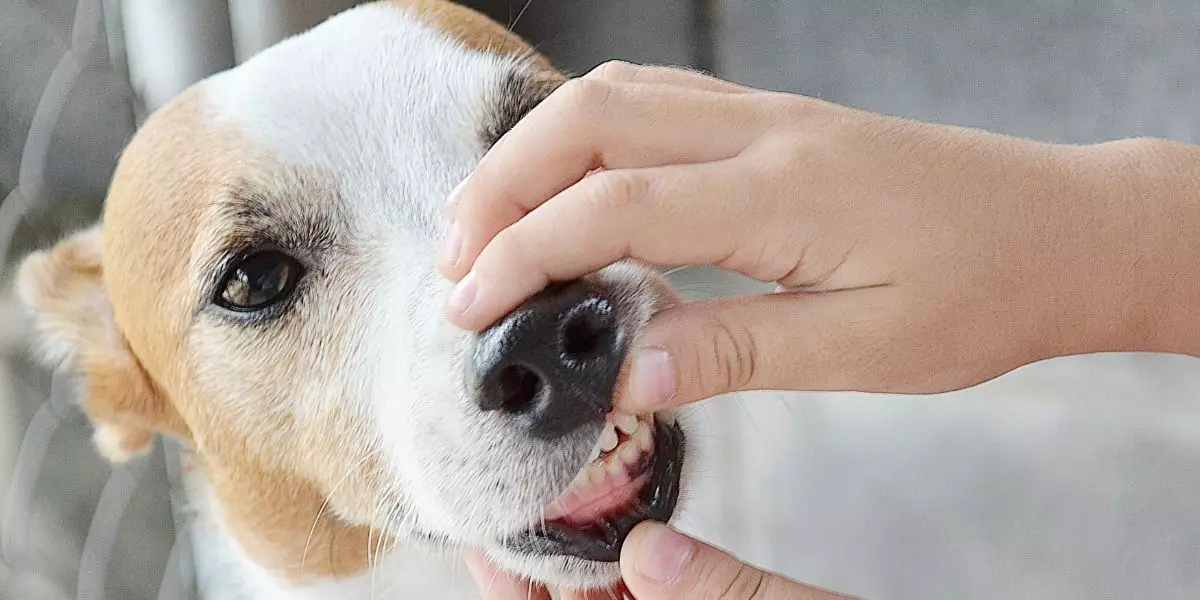What is stomatitis?
Stomatitis in dogs is an inflammation of the mouth that can affect gums, teeth, tongue and oral mucosa. Causes of stomatitis in dogs vary and include dental problems such as plaque and tartar, systemic diseases such as diabetes or leukemia, or allergic reactions to food or medication.
What causes stomatitis in the dog?
There are several potential causes of stomatitis in dogs. The most common causes include:
Dental problems
The plaque and tartar that form on the teeth cause inflammation of the gums, which itself will trigger stomatitis. Dogs who do not have good oral hygiene are more likely to develop dental problems. This is why it is important to ensure the oral health of your animal.
Systemic diseases
Some diseases such as diabetes, leukemia, or kidney disease can cause stomatitis by affecting the immune system and making the mouth more susceptible to infections. These diseases are often difficult to detect without the advice of an expert, in case of doubt consult a veterinarian or a registered specialist.
Allergy
Allergies are one of the sources of stomatitis in dogs. They cause an excessive immune reaction in the tissues of the mouth. Food allergies are one of the most common causes of stomatitis in dogs. Dogs may be allergic to a specific ingredient in their diet, such as meat protein or cereals.
Allergic reactions occur when an animal's immune system recognizes a foreign substance as dangerous and releases antibodies and molecules to fight it. In the case of food allergy, lesions in the mouth and itching sometimes occur, causing ulceration and inflammation.
Viruses and bacteria
Viruses and bacteria cause stomatitis in dogs because they can infect the tissues of the mouth, causing lesions, inflammation and pain. Bacteria are often responsible for acute infections of the mouth, while viruses are more often responsible for chronic infections.
These bacterial and viral infections occur after damage to the mouth tissues, such as scratching or cutting, or after damage to teeth or gums, such as tartar accumulation or periodontal disease. They also spread through the circulatory system, reaching the tissues of the mouth after systemic infection. This is why it is important to ensure your dog a good oral hygiene!
At Veto Compagnon, we recommend the Fraich-Smile powder for cleaning teeth and for fighting tooth plaque, tartar deposits and bad breath.
What are the symptoms of stomatitis?
Symptoms of stomatitis in dogs may include:
- Inflamed and painful gums
- Excessive Salvation
- Difficulty chewing or swallowing food
- Unhappy oral odours
- Weight loss
- Fever
- Mouth ulcers
- Depression or disease
It is important to consult a veterinarian if you suspect your dog has stomatitis, because it can cause serious health problems if not treated. For dental problems, several solutions: professional cleaning of teeth, extraction of infected teeth and treatment of plaque and tartar. For problems related to systemic diseases, it will be a treatment of the underlying disease. For allergic reactions medication will relieve symptoms and dietary changes will be necessary to avoid foods that cause allergic reactions.
It is important to remember that prevention is important to avoid stomatitis in dogs. It is therefore useful to brush your dog's teeth regularly, to give it chewing toys and bones to help maintain good oral health, and to monitor the appearance of signs of oral disease.
Is canine stomatitis dangerous?
Stomatitis in dogs causes serious health problems if not treated. The inflamed and painful gums for your dog make it difficult to eat or drink. If your dog does not eat enough, it will certainly experience weight loss and undernutrition.
Stomatitis also brings infections, Abscesses and fistula in the mouth, which can extend to the surrounding bones and tissues. If this happens, permanent damage to the teeth and bones of the jaw is likely to occur, causing infections that spread to other parts of the body.
In addition, some forms of stomatitis may be caused by systemic diseases underlying diseases such as diabetes, leukaemia or kidney disease, which also cause serious health problems if they are not properly treated.
In summary, stomatitis in dogs can cause serious health problems if it is not treated, so it is important to consult a veterinarian if you think your dog has stomatitis, to establish an appropriate diagnosis and treatment.
What to do in case of canine stomatitis
There are several things you can do to prevent stomatitis in your dog:
Make sure your dog gets good oral hygiene
Brush his teeth regularly with a toothbrush and dog toothpaste, give him chewing bones to help clean his teeth and gums, and have him do professional dental cleanings regularly at the veterinarian.
Give your dog quality food
A healthy and balanced diet helps maintain good oral health.
Pay attention to symptoms of inflammation or irritation of the mouth
If you notice signs of stomatitis in your dog, such as excessive salivation, swollen gums or unpleasant odours, consult a veterinarian immediately for appropriate diagnosis and treatment.
Avoid giving food or medicines that may cause allergic reactions
If you think your dog is allergic to food or medicine, talk to your veterinarian about how to avoid products that cause allergic reactions.
In summary, good oral hygiene, a healthy and balanced diet, and attention to symptoms of stomatitis or systemic diseases can help prevent stomatitis in dogs. It is also important to consult a veterinarian regularly to assess your dog's oral health.





